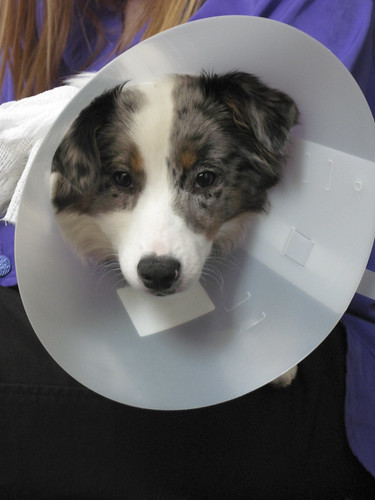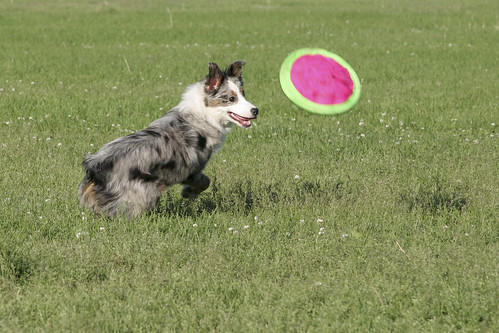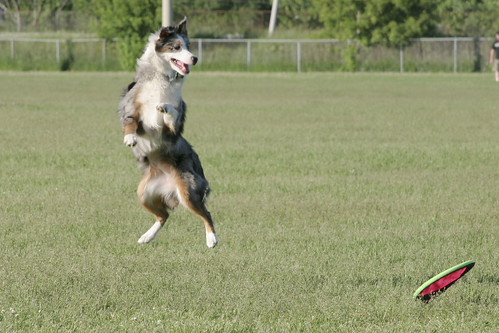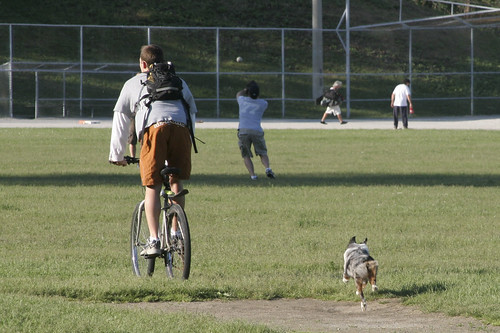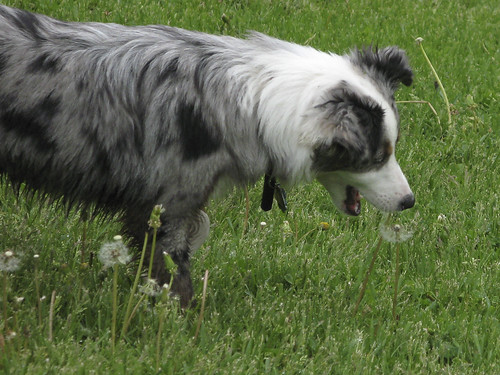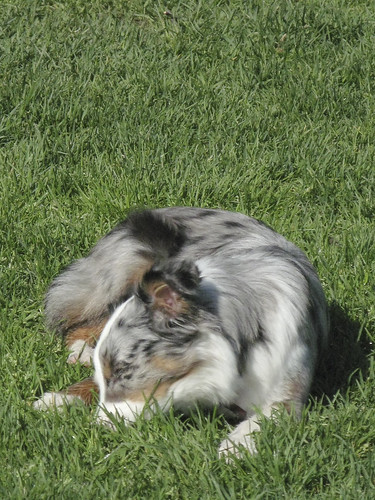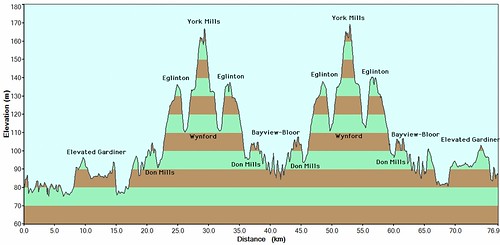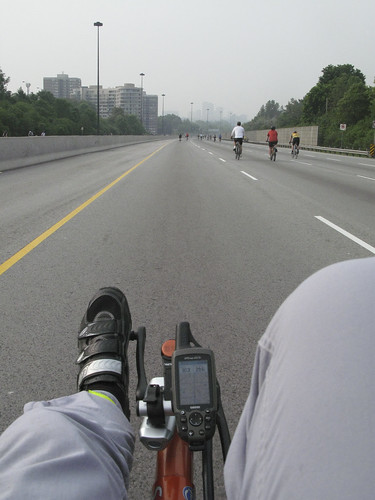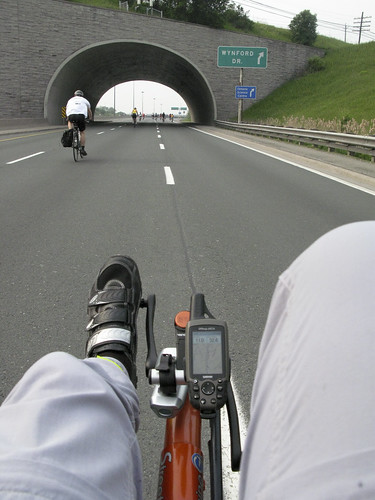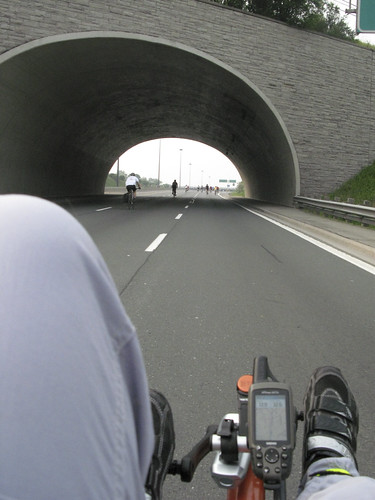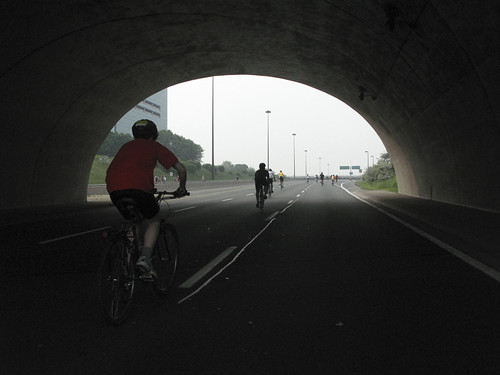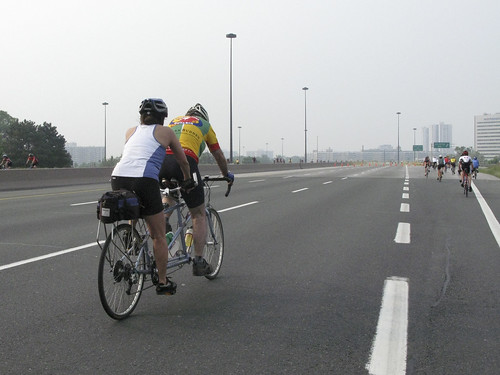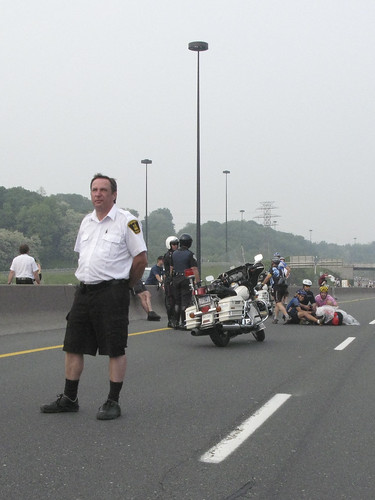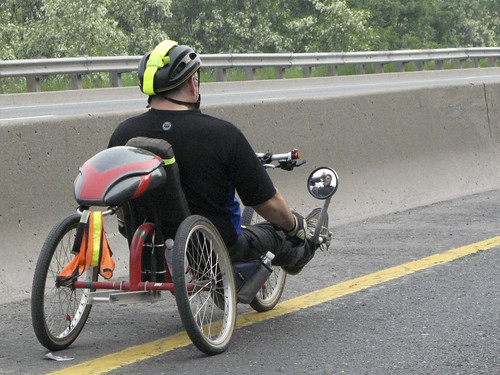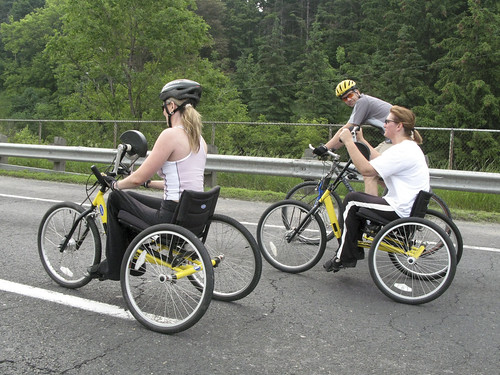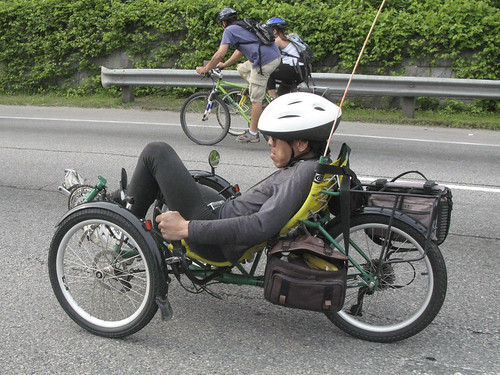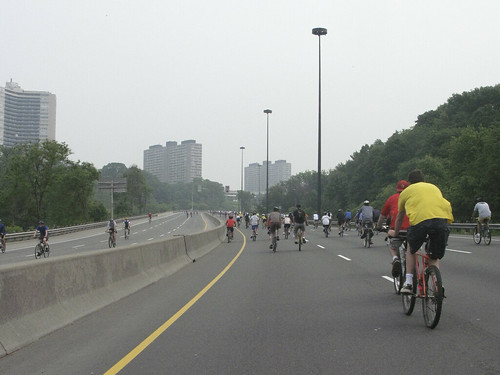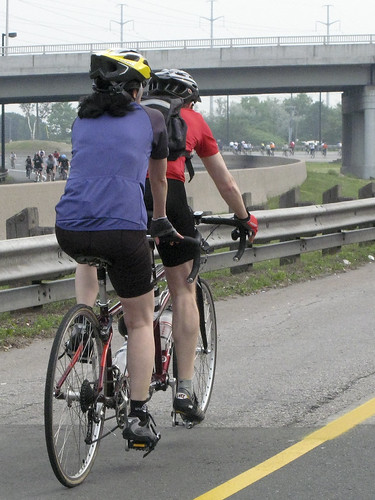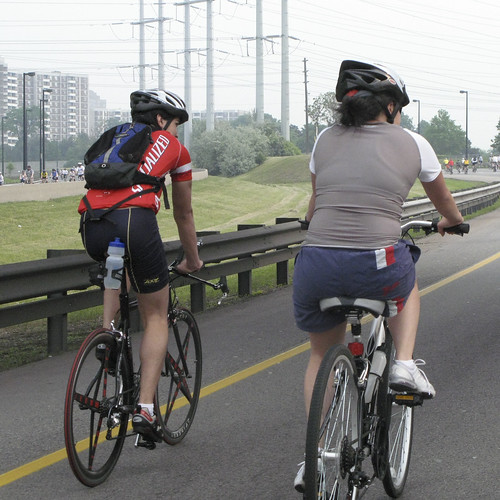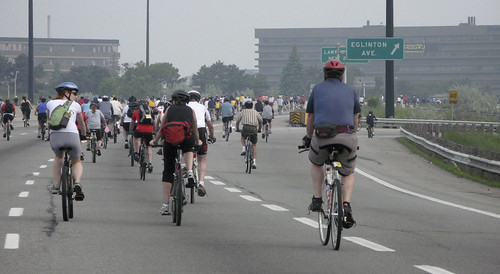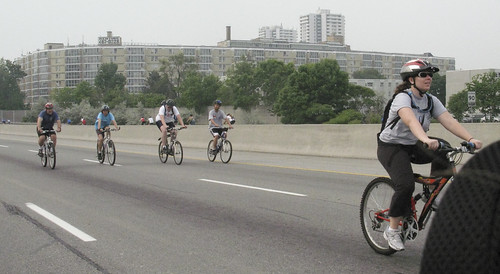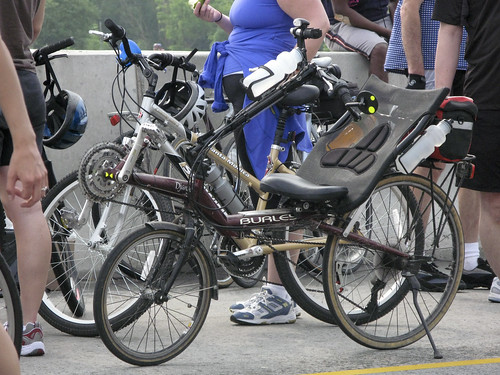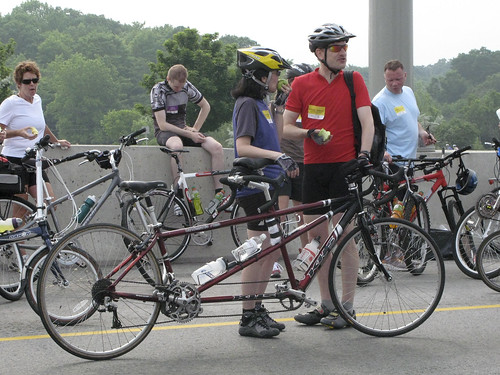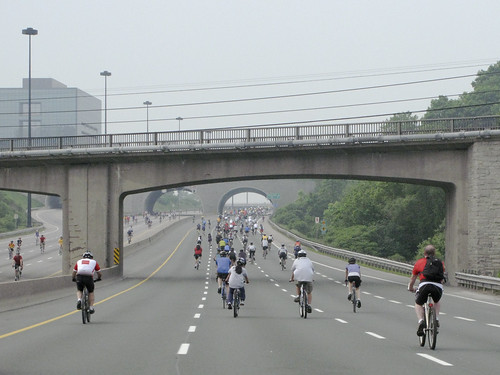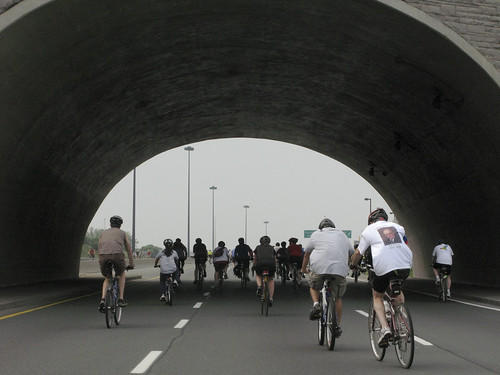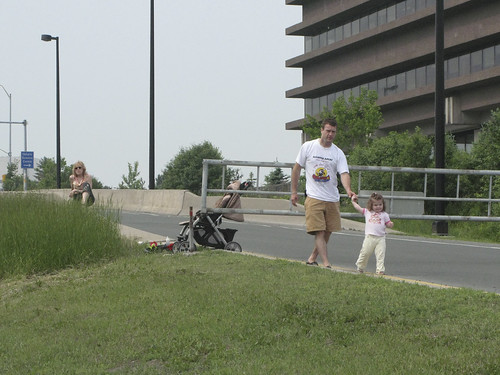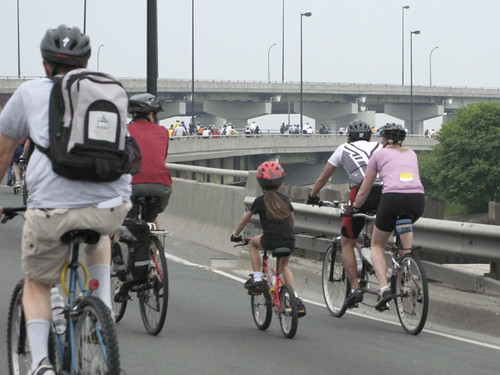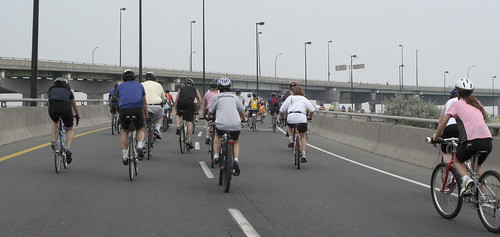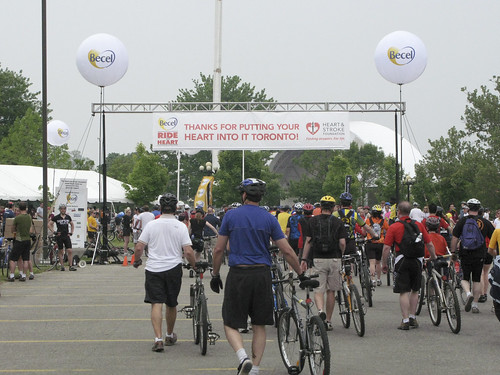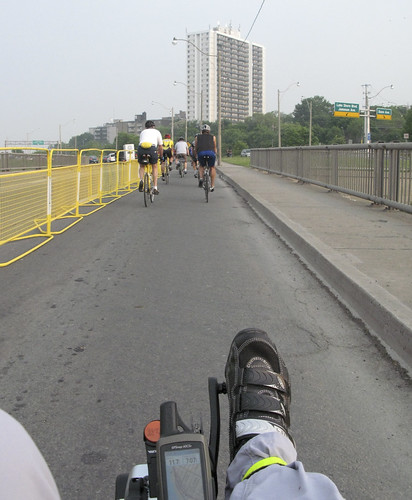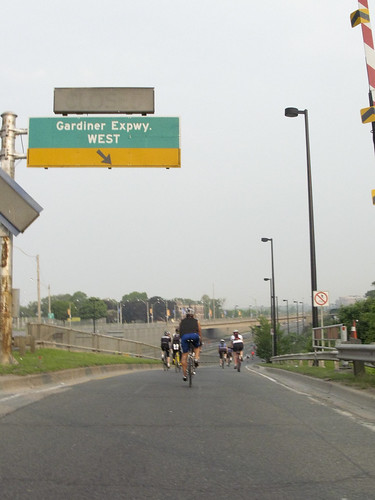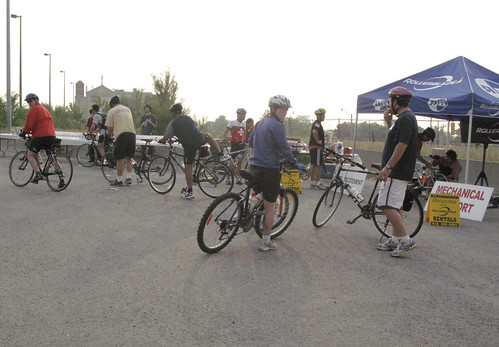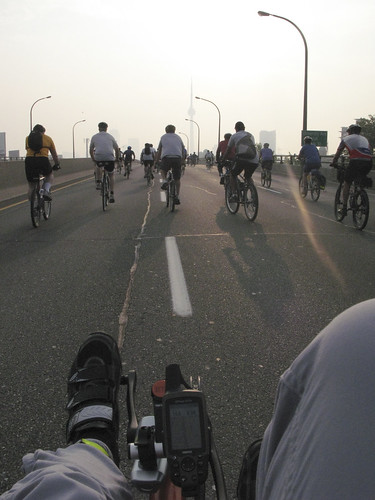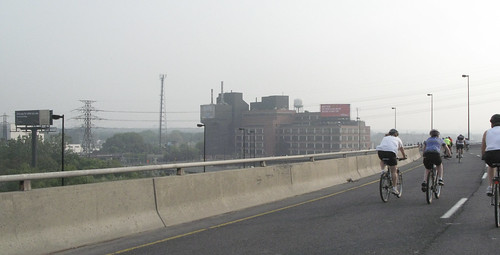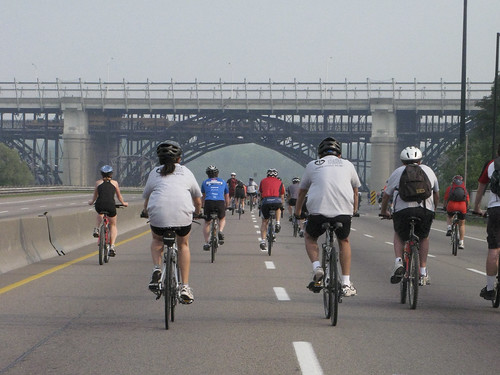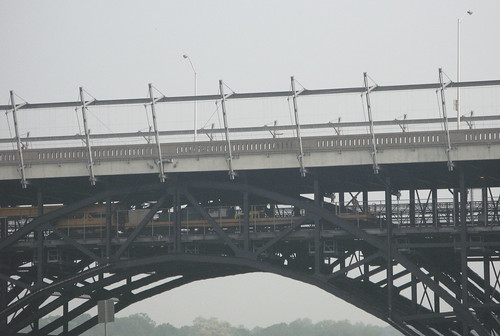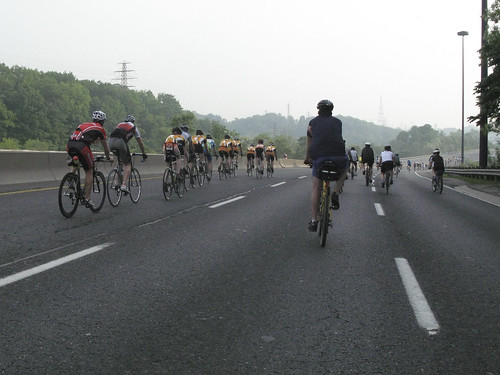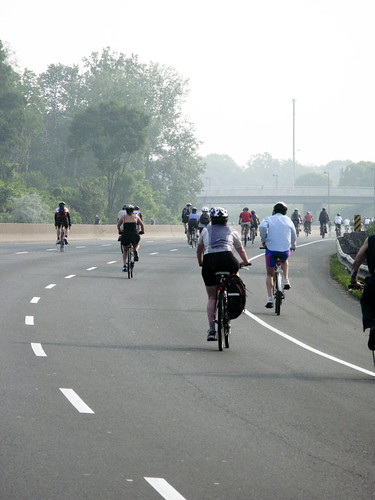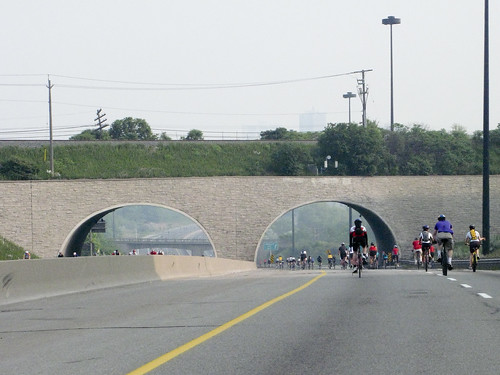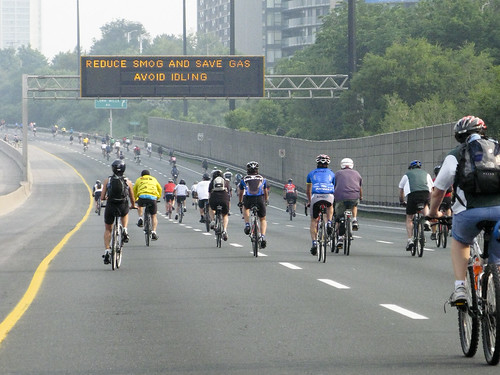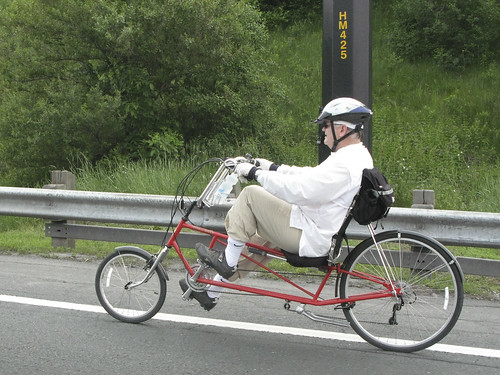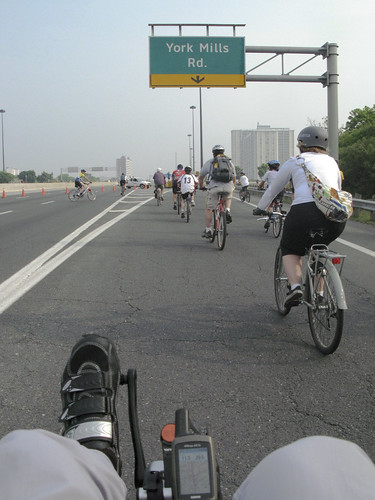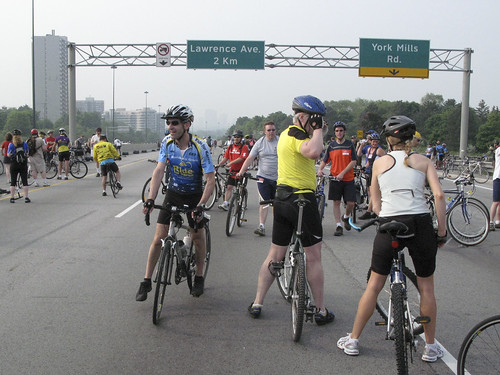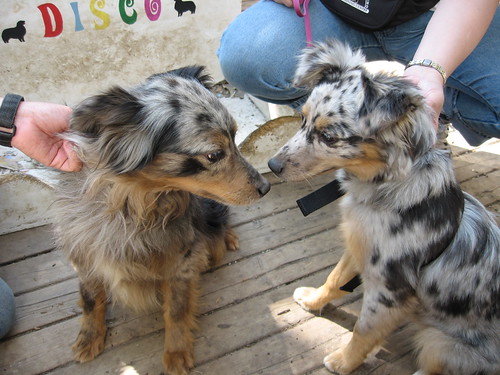No posts in too long, so here's some catch-up on Cobalt!
She got through her spay ok, though she hated the lampshade, of course.
It was several days before we could take her out to run properly -- we could walk her on leash, but she doesn't get enough of a workout that way. As soon as she could go to the park, she took full advantage of it:
She also exhibited a new hobby: decapitating dandelions!
She actually managed to tire herself out, which is unusual for her.
There are more adventures to list, though I don't have all the photos prepared yet -- so those will come later.
Read more!
Friday, June 29, 2007
Monday, June 11, 2007
Cycling: Ride For Heart Followup
A couple of follow-up points from the Ride For Heart:
- I finally have the route up for Google Maps.
- There were about 12,000 cyclists participating.
Friday, June 08, 2007
Cobalt: Back To School
Or, at least, back to day care.
Cobalt's back to Urban Dog, and everyone's excited! I wasn't there for the drop-off (L took her in, I had to head to work to deal with a crisis there), but apparently Cobalt was so psyched she managed to pull her leash from L's hand as she ran to greet the Urban Dog staff, who were just as excited to see her again.
It'll be great to have something tiring her out again! Read more!
Cobalt's back to Urban Dog, and everyone's excited! I wasn't there for the drop-off (L took her in, I had to head to work to deal with a crisis there), but apparently Cobalt was so psyched she managed to pull her leash from L's hand as she ran to greet the Urban Dog staff, who were just as excited to see her again.
It'll be great to have something tiring her out again! Read more!
Tuesday, June 05, 2007
Cycling: Ride for Heart 2007 (Elevation Profile)
Lastly, here's the elevation profile of the ride, with major locations marked. The vertical exaggeration is 300x.
Read more!
Read more!
Cycling: Ride for Heart 2007 (Part 2)
I'd reached the top of the biggest climb -- now it was time to head back down! The drop is a little higher than the climb (56m vertical instead of 52m) since the starting point is on top of the York Mills overpass, a little higher than the York Mills exit from the northbound DVP.
This is where you hit your top speed. The bikes going down are widely spaced, so you don't have to worry so much about crowding and can really open up. My GPS recorded a top speed of 52.3 km/h -- the first time I've broken 50 km/h on a bike. Last year I managed 49.5 before another cyclist cut in front of me and I had to slow down.
As I mentioned in part 1, this slope is in two sections with a level bit in between. It only runs half a kilometer, but it can bleed off a lot of your speed. On the second slope, I took it easier -- and just as well! About halfway down, while I was doing 46 km/h, a cyclist ahead of me lost her water bottle, and it skittered across the road at me. I really didn't want to run over a bottle at 46 km/h, but I didn't want to try a sudden stop at that speed either! Fortunately, I just clipped the bottle, with no ill effects.
The nasty climb. The slope between Wynford and Lawrence is lots of fun going down, but much, much less enjoyable in the other direction. As you can see here, I'm just barely managing 11.0 km/h.
(The numbers on my GPS as speed on the left, and total distance on the right.)
As you go through the railway underpass, at least one of the cyclists going through with you will yell to get the echo. I think it's in the Ride charter.
There were a lot of tandems on the ride, as well as other exotic bikes.
As I was approaching Don Mills, I encountered the first of two accidents I passed on the ride. On the right of the photo is the cyclist, on his side with his back to me, covered in bags of ice to keep the swelling down until the ambulance arrives. It was there when I passed again on my way back north a few minutes later.
After turning around at the Bayview-Bloor exit, I spotted three hand-cranked trikes. These are tricycles with hand-operated pedals instead of foot-operated ones, generally used by paraplegics.
They're very tiring to ride compared to regular bikes, since arms just don't have as much power as legs, so I expect these riders were doing the 50k route. They were about 20k in at this point.
I also passed this recumbent trike several times. The rider generally didn't stop at rest stops, so he'd overtake me while I was getting an orange slide, then I'd catch up with him again later.
I've also seen this fellow riding up and down the waterfront bike trails.
The climb to Eglinton strikes again. On the way I passed another tandem and a very expensive-looking triathlon bike.
At this point, the DVP is covered with not only the 75k riders that I started with, but the 50k riders that started an hour later -- it's starting to get a little crowded. Though the crowd looks thinner behind me.
Back at York Mills for the second time, I took a shorter break. I spotted another tandem and a nice Burley short wheel-base recumbent. This one is similar to my old bike, the Rans V-Rex, though with a fancier frame.
Back to the nasty climb to Wynford. It was harder this time, not only because I was much more tired, bu because there were far more cyclists going slower than I was in front of me. I really wanted to keep my speed up as much as I could, but I couldn't weave through the crowd! Last time I went through the tunnel, it was with one other cyclist -- now it was a dozen.
A four-hour bicycle tour isn't as exciting as the Santa Claus parade, but it did bring out a few spectators.
I passed the second accident just as I was getting to the bottom of the DVP. A cyclist was lying on the road on her front while the paramedics discussed whether or not to back-board her. The good news was that she wasn't so badly hurt that she definitely required the back-board -- the bad news was that she was hurt badly enough that they were considering it.
The last big climb of the ride is at the bottom of the DVP, going back up onto the Gardiner. Fortunately, the climb from the southbound DVP to the westbound Gardiner doesn't have nearly the elevation change of the drop from the eastbound Gardiner to the northbound DVP! (You can see the eastbound Gardiner on the far side of the cyclists in these photos)
The climb is just 13 m over 1 km -- but after almost 70 km of riding, I still felt it!
And, finally, the finish line! The ride actually finished a little before this picture, when the lane heading into the CNE got too crowded to continue riding, and everyone had to get off and walk their bikes to the official finish line.
In the end, it turns out that the 75k course is 77 km long.
After the ride, I biked over to the Sunnyside pavilion for some lunch (though they were still serving breakfast), and then home. I didn't realize it, but the total of the Ride for Heart, plus getting there, getting to Sunnyside, and getting home, almost reached 100 km -- I was 1500 m short. I should have gone around the block a few extra times at the end!
So here are some final statistics from my ride:
And the most important statistic of all: money raised for heart disease research by the 2007 Toronto Ride for Heart:
Of which I raised 0.0074%.
(*1) My GPS has a trip display that keeps live values for various statistics. At the end of the ride, it had a maximum speed of 52.3 km/h recorded. However, the tracks that get uploaded to the computer are not as finely detailed, and only record a peak of 49.4, which occurred over a 100m stretch on the way down from the York Mills rest stop. Most likely that 100m stretch peaked at over 52.3 at some point, but only averaged out to 49.4 overall.
(*2) These numbers are the total of all climbs and all descents, not the net difference between the lowest and highest points (which is 93m). The difference is due to the slight differences in the elevation of the north and southbound DVP lanes in various places.
Read more!
This is where you hit your top speed. The bikes going down are widely spaced, so you don't have to worry so much about crowding and can really open up. My GPS recorded a top speed of 52.3 km/h -- the first time I've broken 50 km/h on a bike. Last year I managed 49.5 before another cyclist cut in front of me and I had to slow down.
As I mentioned in part 1, this slope is in two sections with a level bit in between. It only runs half a kilometer, but it can bleed off a lot of your speed. On the second slope, I took it easier -- and just as well! About halfway down, while I was doing 46 km/h, a cyclist ahead of me lost her water bottle, and it skittered across the road at me. I really didn't want to run over a bottle at 46 km/h, but I didn't want to try a sudden stop at that speed either! Fortunately, I just clipped the bottle, with no ill effects.
The nasty climb. The slope between Wynford and Lawrence is lots of fun going down, but much, much less enjoyable in the other direction. As you can see here, I'm just barely managing 11.0 km/h.
(The numbers on my GPS as speed on the left, and total distance on the right.)
As you go through the railway underpass, at least one of the cyclists going through with you will yell to get the echo. I think it's in the Ride charter.
There were a lot of tandems on the ride, as well as other exotic bikes.
As I was approaching Don Mills, I encountered the first of two accidents I passed on the ride. On the right of the photo is the cyclist, on his side with his back to me, covered in bags of ice to keep the swelling down until the ambulance arrives. It was there when I passed again on my way back north a few minutes later.
After turning around at the Bayview-Bloor exit, I spotted three hand-cranked trikes. These are tricycles with hand-operated pedals instead of foot-operated ones, generally used by paraplegics.
They're very tiring to ride compared to regular bikes, since arms just don't have as much power as legs, so I expect these riders were doing the 50k route. They were about 20k in at this point.
I also passed this recumbent trike several times. The rider generally didn't stop at rest stops, so he'd overtake me while I was getting an orange slide, then I'd catch up with him again later.
I've also seen this fellow riding up and down the waterfront bike trails.
The climb to Eglinton strikes again. On the way I passed another tandem and a very expensive-looking triathlon bike.
At this point, the DVP is covered with not only the 75k riders that I started with, but the 50k riders that started an hour later -- it's starting to get a little crowded. Though the crowd looks thinner behind me.
Back at York Mills for the second time, I took a shorter break. I spotted another tandem and a nice Burley short wheel-base recumbent. This one is similar to my old bike, the Rans V-Rex, though with a fancier frame.
Back to the nasty climb to Wynford. It was harder this time, not only because I was much more tired, bu because there were far more cyclists going slower than I was in front of me. I really wanted to keep my speed up as much as I could, but I couldn't weave through the crowd! Last time I went through the tunnel, it was with one other cyclist -- now it was a dozen.
A four-hour bicycle tour isn't as exciting as the Santa Claus parade, but it did bring out a few spectators.
I passed the second accident just as I was getting to the bottom of the DVP. A cyclist was lying on the road on her front while the paramedics discussed whether or not to back-board her. The good news was that she wasn't so badly hurt that she definitely required the back-board -- the bad news was that she was hurt badly enough that they were considering it.
The last big climb of the ride is at the bottom of the DVP, going back up onto the Gardiner. Fortunately, the climb from the southbound DVP to the westbound Gardiner doesn't have nearly the elevation change of the drop from the eastbound Gardiner to the northbound DVP! (You can see the eastbound Gardiner on the far side of the cyclists in these photos)
The climb is just 13 m over 1 km -- but after almost 70 km of riding, I still felt it!
And, finally, the finish line! The ride actually finished a little before this picture, when the lane heading into the CNE got too crowded to continue riding, and everyone had to get off and walk their bikes to the official finish line.
In the end, it turns out that the 75k course is 77 km long.
After the ride, I biked over to the Sunnyside pavilion for some lunch (though they were still serving breakfast), and then home. I didn't realize it, but the total of the Ride for Heart, plus getting there, getting to Sunnyside, and getting home, almost reached 100 km -- I was 1500 m short. I should have gone around the block a few extra times at the end!
So here are some final statistics from my ride:
- Total distance ridden: 76.91 km
- Climbing distance: 11.54 km
- Descent distance: 12.08 km
- Flat distance: 53.29 km
- Total time: 3:45:25
- Moving time: 3:21:22
- Moving average: 22.9 km/h
- Max speed: 49.4 km/h (from GPS upload) or 52.3 km/h (from GPS max speed display) (*1)
- Climbing speed: 16.0 km/h, 36.0 km/h max
- Descent speed: 28.2 km/h ave, 49.4 km/h max (*1)
- Flat speed: 24.1 km/h ave, 45.4 km/h max
- Total elevation gain: +613 m / -606 m (*2)
- Climb grade: 1.7% ave, 8% max
- Descent grade: -1.5% ave, -8.9% max
- Temperature: 18°C
- Relative humidity: 88.2% to 93.9%
- Wind Speed: 14.8 km/h to 18.5 km/h from the east
And the most important statistic of all: money raised for heart disease research by the 2007 Toronto Ride for Heart:
$2,700,000
Of which I raised 0.0074%.
(*1) My GPS has a trip display that keeps live values for various statistics. At the end of the ride, it had a maximum speed of 52.3 km/h recorded. However, the tracks that get uploaded to the computer are not as finely detailed, and only record a peak of 49.4, which occurred over a 100m stretch on the way down from the York Mills rest stop. Most likely that 100m stretch peaked at over 52.3 at some point, but only averaged out to 49.4 overall.
(*2) These numbers are the total of all climbs and all descents, not the net difference between the lowest and highest points (which is 93m). The difference is due to the slight differences in the elevation of the north and southbound DVP lanes in various places.
Read more!
Cycling: Ride for Heart 2007 (Part 1)
Sunday was the 2007 Toronto Ride for Heart, during which the city closes the Gardiner Expressway and the Don Valley Parkway (DVP), the two downtown freeways, to car traffic and opens them up for cyclists and roller-bladers, who raise money for heart disease research. This year was my third time doing the ride.
Cyclists have a choice of 25k, 50k, or 75k routes, and roller-bladers can do 5k or 10k. All routes start at the west end of the Canadian National Exhibition (CNE) grounds. The 25k and 50k routes head east along the Gardiner, then down onto the northbound DVP. The 25k turns around at the Bayview-Bloor exit, while the 50k continues north to York Mills, then turns and comes all the way back.
The 75k is a little more complicated: it goes west along the Gardiner to the Kingsway exit, then turns east and joins the 25k and 50k routes. After turning around at York Mills, it goes south to the Bayview-Bloor exit, then turns north back to York Mills, then heads south and back to the CNE.
There are some serious climbs on the route. On the 50k and 75k routes, the overall climb is about 90m from the lowest point to the highest, but thanks to the ups and downs of the overall route, there's about 600 vertical meters' worth of climbing over the 75k route (in part because it does the bulk of the climbing twice!).
The first two times I did the ride, I did the 50k route. I'm not a particularly ambitious cyclist -- especially compared to some of the other people on this ride! -- but I had set myself a goal of maintaining a moving average of at least 20 km/h over the ride. I was rather pleased that I not only managed that, but I kept my overall average speed -- including rest stops -- over 20 km/h also. This year I decided to try the 75k route, with the same 20 km/h goal.
The trouble with the 75k route is that you have to show up for 6:45 to get in on it. Actually, only a select few cyclists actually start at 6:45: hard-core racers can arrange to be at the front of the line so they have the entire freeway to themselves as they do the route (at least until they've turned around at Bayview-Bloor to head north again -- more on that later). Still, the rest of us are all underway by 7:10.
The first leg is along Lakeshore Road going west to the Gardiner westbound on-ramp. This was new to me -- the 50k route takes the eastbound on-ramp that's right by the CNE exit.
There are rest stops all along the route. This was the first, just after the Kingsway turnaround. They have lots of water, as well as apples, oranges, and bananas, and mechanical service stations.
The day was rather overcast and threatening rain (in fact, it did rain a little towards the end of my run), which is actually perfect weather for this -- no hot sun to burn your skin and bake the fluids from your body. Still, once we turned around at Kingsway, we were riding into the sun for a while, which was pretty bright in spite of the clouds.
This shot is from the first major climb: from the Gardiner at ground-level to the elevated Gardiner, a climb of about 20 m over 2.3 km, followed by a nice relaxing downhill run that drops 11m over 1.4 km.
Taking photos from a moving bike is tricky, especially when you're doing 30 km/h, so I didn't quite get the angle I wanted for this one. If you look closely behind the railing, you can see the ramp down from the Gardiner to the northbound DVP, a drop of 18m over about 515m -- you get going pretty fast down here! Naturally, I don't have any photos from when I was actually going down that, as I topped 40 km/h for the first time in the ride on that one.
The first time I did the ride, I didn't know that the left-hand lane has a manhole at the bottom of the hill that isn't quite flush with the road, and hit that at about 45 km/h. Fortunately, I made it over, but someone else wasn't as lucky: on my way back, there was an ambulance at that spot.
The Bloor Viaduct is a major landmark on the ride. It marks the end of the first climb after getting off the Gardiner (20 m in 2 km), and tells the 25 km riders that they're getting close to their turn-around.
This year as I was approaching the bridge, a TTC maintenance train was heading from Castle Frank station to Danforth -- you can just barely make it out among the girders under the roadway. It honked its horn at the cyclists, and a maintenance worker on the front waved to us as we went by (he's hard to spot, but if you click the image it'll take you to the Flickr page, where he's highlighted).
Just after I passed the Bayview-Bloor exit -- the point where 75k riders coming south turn around to go north again -- a car came up behind me. I had plenty of warning, though, as it was driving slowly with a megaphone going "The leaders of the 75k are coming up behind you! Please move to the right lane!" over and over. These are the hard-core cyclists who start right at 6:45 and ride the whole route like a race. At this point, I was 50 minutes into the ride, and had covered about 19 km, but they'd covered almost 43 km. They had a bit of a head start, as they started about 20 minutes ahead of me, but even so... My average speed (including stops) at this point was about 23 km/h. Theirs was over 37! And I hadn't even done the big hills yet!
The first really big climb is the run up from Don Mills Road to Eglinton. The Parkway actually leaves the valley here, climbing to above grade in East York for a while before diving back down. Overall, the climb is 45 m (half the total vertical climb from the bottom of the DVP to York Mills!) in 3.2 km.
The first time up this year, I was struck by how much easier it was with the new bike. This climb was always daunting -- it's not the steepest on the ride, but it is the longest without a break -- but it went really smoothly with the new StreetMachine, and I managed to take the climb at an average of 20 km/h.
The second time up, I was a little less enthusiastic, though I did keep my speed on the climb at 19 km/h.
After the longest hill comes the steepest. The DVP heads back into the valley in a drop from Eglinton to Lawrence of 26 m over 1.2 km. It's great fun -- though a little daunting! -- one the way north... On the way south, it's the nastiest climb of the route, and one of the main reasons why I did 50k instead of 75 last year.
The last climb (going north) is from Lawrence to the turnaround at York Mills, 52 m over 2.5 km. It's higher and shorter (horizontally) than the Eglinton climb, but it's not as bad overall because there's a level section about halfway up that lets you catch your breath. The city chose this place to put a pixel board that provides helpful advice that was rather wasted on us cyclists.
I wasn't the only one out on a non-standard bike. Here's a recumbent style known as a "long wheel-base" or LWB -- It puts the front wheel in front of the pedals, instead of behind like on my SWB (short wheel-base). They're easier to get used to, since the position is more natural, but they're hard to fit into cars!
Finally, the top of the last climb! The route leaves the DVP at the York Mills exit, then heads around to the other side of the cloverleaf to get back on going south. There, there's another rest stop (my third of the ride) and the start of the longest descent on the route (slightly longer than the climb, since the rest stop is a little higher than the York Mills off-ramp was).
The last two times, this was the halfway point -- this time, it's not quite 40%! Time to take a break.
Update: Corrected some of the distances and fleshed out the bit about the 75k leaders. Added links to other parts. Read more!
Cyclists have a choice of 25k, 50k, or 75k routes, and roller-bladers can do 5k or 10k. All routes start at the west end of the Canadian National Exhibition (CNE) grounds. The 25k and 50k routes head east along the Gardiner, then down onto the northbound DVP. The 25k turns around at the Bayview-Bloor exit, while the 50k continues north to York Mills, then turns and comes all the way back.
The 75k is a little more complicated: it goes west along the Gardiner to the Kingsway exit, then turns east and joins the 25k and 50k routes. After turning around at York Mills, it goes south to the Bayview-Bloor exit, then turns north back to York Mills, then heads south and back to the CNE.
There are some serious climbs on the route. On the 50k and 75k routes, the overall climb is about 90m from the lowest point to the highest, but thanks to the ups and downs of the overall route, there's about 600 vertical meters' worth of climbing over the 75k route (in part because it does the bulk of the climbing twice!).
The first two times I did the ride, I did the 50k route. I'm not a particularly ambitious cyclist -- especially compared to some of the other people on this ride! -- but I had set myself a goal of maintaining a moving average of at least 20 km/h over the ride. I was rather pleased that I not only managed that, but I kept my overall average speed -- including rest stops -- over 20 km/h also. This year I decided to try the 75k route, with the same 20 km/h goal.
The trouble with the 75k route is that you have to show up for 6:45 to get in on it. Actually, only a select few cyclists actually start at 6:45: hard-core racers can arrange to be at the front of the line so they have the entire freeway to themselves as they do the route (at least until they've turned around at Bayview-Bloor to head north again -- more on that later). Still, the rest of us are all underway by 7:10.
The first leg is along Lakeshore Road going west to the Gardiner westbound on-ramp. This was new to me -- the 50k route takes the eastbound on-ramp that's right by the CNE exit.
There are rest stops all along the route. This was the first, just after the Kingsway turnaround. They have lots of water, as well as apples, oranges, and bananas, and mechanical service stations.
The day was rather overcast and threatening rain (in fact, it did rain a little towards the end of my run), which is actually perfect weather for this -- no hot sun to burn your skin and bake the fluids from your body. Still, once we turned around at Kingsway, we were riding into the sun for a while, which was pretty bright in spite of the clouds.
This shot is from the first major climb: from the Gardiner at ground-level to the elevated Gardiner, a climb of about 20 m over 2.3 km, followed by a nice relaxing downhill run that drops 11m over 1.4 km.
Taking photos from a moving bike is tricky, especially when you're doing 30 km/h, so I didn't quite get the angle I wanted for this one. If you look closely behind the railing, you can see the ramp down from the Gardiner to the northbound DVP, a drop of 18m over about 515m -- you get going pretty fast down here! Naturally, I don't have any photos from when I was actually going down that, as I topped 40 km/h for the first time in the ride on that one.
The first time I did the ride, I didn't know that the left-hand lane has a manhole at the bottom of the hill that isn't quite flush with the road, and hit that at about 45 km/h. Fortunately, I made it over, but someone else wasn't as lucky: on my way back, there was an ambulance at that spot.
The Bloor Viaduct is a major landmark on the ride. It marks the end of the first climb after getting off the Gardiner (20 m in 2 km), and tells the 25 km riders that they're getting close to their turn-around.
This year as I was approaching the bridge, a TTC maintenance train was heading from Castle Frank station to Danforth -- you can just barely make it out among the girders under the roadway. It honked its horn at the cyclists, and a maintenance worker on the front waved to us as we went by (he's hard to spot, but if you click the image it'll take you to the Flickr page, where he's highlighted).
Just after I passed the Bayview-Bloor exit -- the point where 75k riders coming south turn around to go north again -- a car came up behind me. I had plenty of warning, though, as it was driving slowly with a megaphone going "The leaders of the 75k are coming up behind you! Please move to the right lane!" over and over. These are the hard-core cyclists who start right at 6:45 and ride the whole route like a race. At this point, I was 50 minutes into the ride, and had covered about 19 km, but they'd covered almost 43 km. They had a bit of a head start, as they started about 20 minutes ahead of me, but even so... My average speed (including stops) at this point was about 23 km/h. Theirs was over 37! And I hadn't even done the big hills yet!
The first really big climb is the run up from Don Mills Road to Eglinton. The Parkway actually leaves the valley here, climbing to above grade in East York for a while before diving back down. Overall, the climb is 45 m (half the total vertical climb from the bottom of the DVP to York Mills!) in 3.2 km.
The first time up this year, I was struck by how much easier it was with the new bike. This climb was always daunting -- it's not the steepest on the ride, but it is the longest without a break -- but it went really smoothly with the new StreetMachine, and I managed to take the climb at an average of 20 km/h.
The second time up, I was a little less enthusiastic, though I did keep my speed on the climb at 19 km/h.
After the longest hill comes the steepest. The DVP heads back into the valley in a drop from Eglinton to Lawrence of 26 m over 1.2 km. It's great fun -- though a little daunting! -- one the way north... On the way south, it's the nastiest climb of the route, and one of the main reasons why I did 50k instead of 75 last year.
The last climb (going north) is from Lawrence to the turnaround at York Mills, 52 m over 2.5 km. It's higher and shorter (horizontally) than the Eglinton climb, but it's not as bad overall because there's a level section about halfway up that lets you catch your breath. The city chose this place to put a pixel board that provides helpful advice that was rather wasted on us cyclists.
I wasn't the only one out on a non-standard bike. Here's a recumbent style known as a "long wheel-base" or LWB -- It puts the front wheel in front of the pedals, instead of behind like on my SWB (short wheel-base). They're easier to get used to, since the position is more natural, but they're hard to fit into cars!
Finally, the top of the last climb! The route leaves the DVP at the York Mills exit, then heads around to the other side of the cloverleaf to get back on going south. There, there's another rest stop (my third of the ride) and the start of the longest descent on the route (slightly longer than the climb, since the rest stop is a little higher than the York Mills off-ramp was).
The last two times, this was the halfway point -- this time, it's not quite 40%! Time to take a break.
Update: Corrected some of the distances and fleshed out the bit about the 75k leaders. Added links to other parts. Read more!
Saturday, June 02, 2007
Cobalt: Dad
Photon's people visited Stoverly Aussies, and Photon got a chance to meet her father (and Cobalt's), Max. There's a write-up at Chez PLJ.
Apparently Photon is just slightly smaller than Max -- which means that Cobalt's probably just slightly bigger than Max. Read more!
Apparently Photon is just slightly smaller than Max -- which means that Cobalt's probably just slightly bigger than Max. Read more!
Subscribe to:
Comments (Atom)
